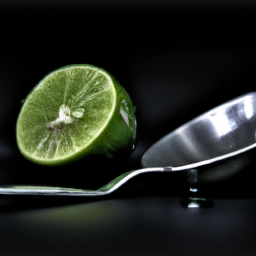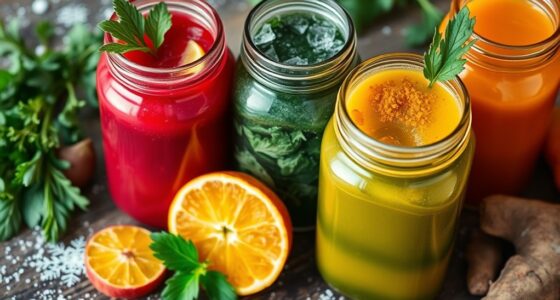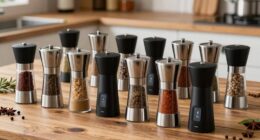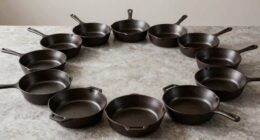Whenever I feel like having some fresh orange juice, I always wonder how much juice can be squeezed out of just one orange. It seems like a simple question, but in reality, there are several factors that affect the amount of juice that can be obtained from an orange.
In this article, I will explore the different variables that can impact juice yield, as well as the average amount of juice you can expect from one orange.
Firstly, it’s important to note that the juice yield of an orange can depend on factors such as its ripeness, size, and juiciness. For instance, a ripe and juicy orange will likely yield more juice than a dry or unripe one. Additionally, the size of the orange can play a role, as larger oranges tend to have more juice than smaller ones.
In this article, we will delve into the various factors that can impact juice yield and provide tips for maximizing the amount of juice you can extract from an orange.
Key Takeaways
- Average juice yield of one orange ranges from 1/4 cup to 1/2 cup, depending on the ripeness, size, and juiciness of the orange.
- Different orange varieties have varying juice yields, with Valencia, Blood Orange, and Navel Oranges being good options for juicing.
- Tips for maximizing juice yield include selecting ripe oranges, rolling the orange before juicing, cutting the orange in half crosswise, and using a citrus juicer or squeezing by hand.
- Orange juice is a nutritional powerhouse, containing vitamin C, potassium, folate, high fiber content, antioxidants, and other beneficial nutrients that contribute to improved cognitive function, boosted immune system, and reduced inflammation.
Factors that Affect Juice Yield
You’ll get more juice out of your orange if you squeeze it while it’s still firm instead of waiting until it’s soft and squishy. This is because the juice extraction methods that you use can have a significant impact on the amount of juice that you get from your orange.
When an orange is firm, it is easier to extract the juice from it using a manual or electric juicer. However, when the orange is soft and squishy, it can be challenging to extract the juice, and you may end up with less juice than you would have gotten if you had squeezed it while it was still firm.
The ripeness of an orange also affects the juice yield. When an orange is ripe, it contains more juice than when it is unripe. However, if the orange is overripe, it may be too soft and squishy, resulting in less juice yield. Therefore, it’s essential to strike a balance between the ripeness of the orange and the juice extraction methods that you use to get the most juice out of your orange.
With that said, let’s move on to the next section, where we’ll discuss the average juice yield of one orange.
Average Juice Yield of One Orange
When you give that citrus fruit a good squeeze, it’s surprising just how much liquid gold can be extracted. The average juice yield of one orange can range from 1/4 cup to 1/2 cup, depending on the size and ripeness of the fruit.
Here are some factors that can affect the juice yield:
- Juicing techniques: Using a juicer or a hand-held citrus press can result in a higher juice yield compared to simply squeezing the fruit with your hands.
- Ripeness: Fully ripe oranges have a higher juice content than unripe ones.
- Temperature: Warmer fruits tend to produce more juice than colder ones.
- Storage and shelf life: Oranges that have been stored for a long time or have been exposed to air may have a lower juice yield.
Knowing the average juice yield of one orange can help you determine how many fruits you need to juice for a recipe or a serving. However, it’s important to note that different varieties of oranges can have varying juice yields. Let’s explore this in the next section.
Different Varieties of Oranges and Their Juice Yield
If you’re looking to experiment with different types of citrus fruits, it’s worth noting that various varieties of oranges can produce varying amounts of liquid when juiced.
Some of the best orange varieties for juicing include Valencia, Blood Orange, and Navel Oranges.
Valencia oranges are typically used in the orange juice market trends as they have a high juice yield and are available all year round.
Blood oranges, on the other hand, have a lower juice yield but are known for their unique flavor and color.
Navel oranges are also a popular choice for juicing due to their sweet and tangy taste.
When looking to maximize juice yield, it’s important to choose the right variety of oranges.
Tips for Maximizing Juice Yield
Maximizing the amount of liquid extracted from citrus fruits requires proper preparation and the right tools. To get the most juice out of an orange, here are a few tips to keep in mind:
-
Select ripe oranges: Ripe oranges are heavier and have thinner skin, making them easier to juice. Look for oranges that are firm and free of bruises or blemishes.
-
Roll the orange: Before juicing, roll the orange on a hard surface to break down the cell walls and release more juice.
-
Cut the orange in half: Use a sharp knife to cut the orange in half crosswise, not lengthwise. This will help you extract the most juice.
-
Use a citrus juicer: A citrus juicer is the best tool for extracting the most juice from an orange. It’s designed to squeeze the juice out of the fruit while leaving the pulp and seeds behind.
-
Squeeze the orange: If you don’t have a citrus juicer, you can still get a lot of juice out of an orange by squeezing it by hand. Use a citrus reamer or your hands to press down on the orange and extract the juice.
By following these juicing techniques and selecting ripe oranges, you’ll be able to extract the most juice from your oranges.
In the next section, we’ll talk about the tools you’ll need to make the juicing process even easier.
Tools for Juicing Oranges
To get the most out of your citrus fruits, having the right tools is key. When it comes to juicing oranges, there are a few different techniques and juicer types to consider.
Manual juicers, such as a hand-held reamer or a countertop press, are great options for those who want to maximize their juice yield. These tools allow you to extract every last drop of juice from the fruit, without having to use too much hand strength or effort. Plus, using a manual juicer can yield up to 20% more juice than using your hands alone!
Electric juicers are also popular for juicing oranges. These machines can quickly and efficiently juice large quantities of fruit, making them a great option for those who want to make fresh orange juice regularly. However, it’s important to note that electric juicers can sometimes heat up the juice, which can affect its flavor and nutritional value.
Ultimately, the type of juicer you choose will depend on your personal preferences and juicing needs.
When you have freshly squeezed orange juice on hand, there are so many ways to incorporate it into your favorite recipes. From marinades and dressings to smoothies and cocktails, the possibilities are endless. Let’s explore some delicious ways to use orange juice in your cooking and baking!
Using Orange Juice in Recipes
Get ready to elevate your culinary game by incorporating fresh-squeezed orange juice into your favorite recipes. Using orange juice as a marinade is a great way to add a sweet and tangy flavor to your meats. The acidity in the orange juice helps tenderize the meat while infusing it with a delicious citrus flavor.
Simply mix together some orange juice, olive oil, garlic, and your preferred spices, then marinate your meat for a few hours before cooking. You’ll be amazed at how much the orange juice enhances the flavor of your dish.
But orange juice isn’t just for savory dishes. Adding orange juice to cocktails can also take your drinks to the next level. The sweetness of the orange juice pairs perfectly with many spirits, making it a versatile ingredient for any cocktail recipe.
Try mixing together some orange juice, vodka, and triple sec for a classic Screwdriver. Or add some orange juice to a Margarita for a delicious twist on the traditional recipe. The possibilities are endless when it comes to adding orange juice to your cocktail creations.
As you can see, orange juice is a versatile ingredient that can be used in a variety of ways to enhance your culinary creations. But there are even more uses for orange juice that you may not have thought of.
Other Uses for Orange Juice
Orange juice isn’t just for drinking or cooking with, it can also be used in a variety of unexpected ways that will surprise and delight you. One of my favorite ways to use orange juice is by incorporating it into my juicing techniques. Adding fresh squeezed orange juice to a variety of fruits and vegetables creates a delicious and nutritious drink that is perfect for starting the day or as a mid-day pick-me-up. Additionally, orange juice can be used in smoothies as a natural sweetener and flavor enhancer.
Another way to use orange juice is by incorporating it into your beauty routine. The high concentration of vitamin C in orange juice can brighten and even out skin tone, and the natural acids can help exfoliate and reduce the appearance of acne scars. Additionally, orange juice can be used as a natural hair lightener when applied to hair and left to sit in the sun.
Proper storage methods are important for maintaining the freshness and quality of orange juice. It should be kept refrigerated and consumed within a few days of opening. Orange juice has a variety of uses beyond just drinking and cooking. From juicing techniques to beauty routines, there are many benefits to incorporating orange juice into your daily life.
In the next section, we’ll explore the nutritional value of orange juice.
Nutritional Value of Orange Juice
The nutritional benefits of incorporating fresh squeezed orange juice into your diet are numerous and include a high concentration of vitamin C, potassium, and folate. Vitamin C is essential for maintaining a healthy immune system, and just one cup of orange juice can provide the daily recommended intake.
Potassium is an electrolyte that helps regulate blood pressure and supports the function of muscles and nerves. Folate is crucial for cell growth and development and can help prevent birth defects in pregnant women.
While orange juice is a good source of vitamins and minerals, it’s important to note that it also contains a fair amount of sugar. One cup of orange juice contains around 21 grams of sugar, which can add up quickly if consumed in excess.
It’s important to balance the consumption of orange juice with other low-sugar beverages and foods to maintain a healthy, balanced diet. With that said, the health benefits of drinking orange juice are undeniable, and incorporating it into your daily routine can provide a boost of nutrients to support overall health and well-being.
Health Benefits of Drinking Orange Juice
You may have heard the saying, ‘an apple a day keeps the doctor away,’ but did you know that adding a glass of freshly squeezed orange juice to your morning routine can also provide numerous health benefits? Here are 5 reasons why you should consider incorporating this juicy fruit into your diet:
-
Orange juice is an excellent source of vitamin C, which is essential for maintaining a healthy immune system. A single glass of orange juice can provide up to 100% of your recommended daily intake of this vital nutrient, helping to protect your body against illness and disease.
-
The high fiber content of orange juice makes it an effective aid for digestion. Drinking a glass of orange juice can help to regulate bowel movements, prevent constipation, and promote a healthy gut microbiome.
-
Orange juice is also rich in antioxidants, which can help to reduce inflammation in the body and protect against cell damage. This can help to prevent chronic diseases such as heart disease, cancer, and Alzheimer’s.
-
The potassium content in orange juice can help to regulate blood pressure, reducing the risk of heart disease and stroke.
-
Drinking orange juice can also help to improve cognitive function, thanks to its high folate content. This nutrient is essential for brain development and can help to prevent cognitive decline in older adults.
Drinking orange juice can have a significant positive impact on your health. From boosting your immune system to improving your digestion and protecting against chronic disease, this juicy fruit is a nutritional powerhouse that shouldn’t be overlooked.
Frequently Asked Questions
How many calories are in an orange?
I researched orange nutrition and found that they are low in calories, high in vitamin C and fiber, and have potential health benefits such as reducing inflammation. However, I am not able to provide the exact number of calories in an orange without the context of how it is prepared.
Can orange juice be frozen?
Yes, orange juice can be frozen. It’s best to store it in an airtight container or freezer bag to prevent freezer burn. Freezing oranges is also possible, but the texture may change when thawed.
What is the best time of day to drink orange juice?
Did you know that drinking orange juice in the morning can boost your metabolism by up to 25%? It’s best to drink it before breakfast for maximum benefits. Evening consumption can disrupt sleep due to its high sugar content.
How long does it take to juice an orange?
When it comes to juicing an orange, there are different techniques you can use to get the most juice. Some Orange Juicing Tips include rolling the orange on a surface before cutting it in half, using a citrus juicer, and squeezing the orange by hand. Depending on the method you choose, it can take anywhere from a few seconds to a couple of minutes to juice an orange.
Can orange juice be used as a natural cleaning agent?
Did you know that orange juice has cleaning power? It’s true! With its high acidity, orange juice can be used as a natural cleaning agent for things like countertops and even removing rust. It’s a great alternative use for this delicious beverage.
Conclusion
So, in conclusion, the amount of juice in one orange can vary depending on a number of factors, but the average yield is around 1/4 to 1/3 cup of juice per fruit. However, it’s worth noting that some varieties of oranges, such as Valencia oranges, tend to have a higher juice yield than others.
One interesting statistic to consider is that one glass of orange juice contains more than 100% of the recommended daily intake of vitamin C. This is an important nutrient that helps support a healthy immune system, and it’s especially important during cold and flu season.
So, whether you enjoy orange juice on its own or use it in recipes, you can feel good knowing that you’re getting a healthy dose of vitamin C with every sip.









